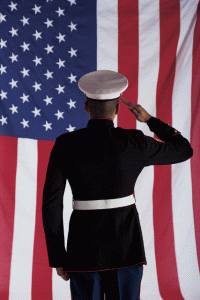 In the last couple of years, I’ve noticed that I usually have at least one military veteran student in my class, and I started wondering, “What should writing programs and instructors do to help these veterans successfully reintegrate not just back into civilian life, but into higher ed, too?
In the last couple of years, I’ve noticed that I usually have at least one military veteran student in my class, and I started wondering, “What should writing programs and instructors do to help these veterans successfully reintegrate not just back into civilian life, but into higher ed, too?
I’ve decided to devote a series of posts to asking questions and finding answers about the military veteran experience in writing classrooms and what we as their instructors can, and should, do to make the transition to academic life easier. Composition scholars and researchers D. Alexis Hart and Roger Thompson recently published the white paper “‘An Ethical Obligation’: Promising Practices for Student Veterans in College Writing Classrooms”. This report, funded by a 2011 Conference on College Composition and Communication (CCCC) grant, recommends that writing programs and instructors at two- and four-year institutions begin exploring their veteran populations and what services are available at their schools. Based on my experience, this is sound advice. But, I would guess that many writing instructors haven’t even begun the search.
This is increasingly important, though, because my classroom isn’t the only one to see this transformation. Let’s get numerical for a moment:
- The U.S. Department of Veterans Affairs reports over 1 million veterans attended colleges and universities between 2009 and 2013.
- Students using Post 9-11 Bill benefits grew from under 50,000 in 2009 to over 500,000 in 2011.
- 53.6% of beneficiaries used benefits to complete undergraduate work at a college or vocational/technical school.
- In my tri-state area alone (Indiana, Kentucky and Ohio), in 2011 there were over 46,000 students using their benefits.
- There are over 2,000 veterans attending The Ohio State University (2013).
- The University of Cincinnati (UC) reported about 1,200 enrolled military veterans (2012).
- Northern Kentucky University, about 1/3 the enrollment of UC, reported about 500 enrolled military veterans in 2013.
These statistics should make it clear to writing instructors that, whether you teach basic writing, composition, or technical writing, your chances of encountering a military veteran in your classroom are growing rapidly.
What makes me pause, though, is what happens when I do? Does this, or should this, change my teaching strategies? Do these students learn differently? Should I be reaching out to them? Should I encourage them to use writing as a therapy? Am I prepared for that? What services does my school offer? Would I know where to send them if issues arose?
All of these questions affect the way we run our classrooms, and as educators, it’s important we know the answers—or at least start the search to find out. My experience tells me these students may have experiences or characteristics that affect their lives in every way, including their understanding of and proficiency in our classrooms. What that means to me is that it’s now my duty to find out what we can do and how we can help.
Sources: U.S. Department of Veterans Affairs Annual Benefits Report, Fiscal Year 2011; University of Cincinnati; Northern Kentucky University; The Ohio State University.




Great article. I’m on the other side of the coin (the student-vet) and it has been an interesting experience seeing how my profs. deal with me in their class. Not that I’m out of control or anything, but the subject matter I tend to gravitate towards has made them all,well, a little uneasy. But they’ve been fantastic and accepting of my crazed military-experiential writings, and have helped me along tremendously. Though, I’m sure anyone of them would love to know how to teach the veterans in their classroom more effectively.